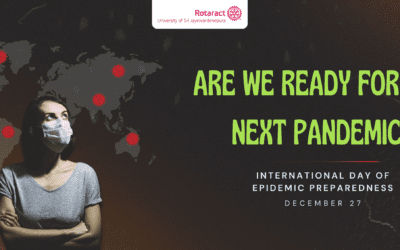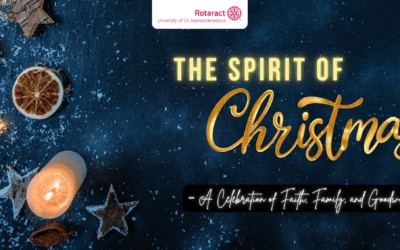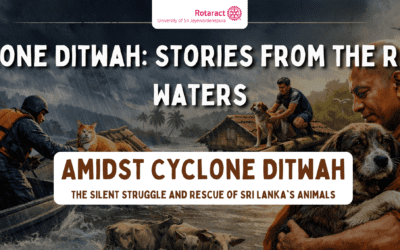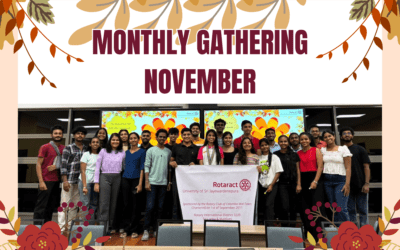PROJECTS
NEWS NEST
BACKSTAGE

CLUB SERVICE
Monthly Gathering – August 2025
🌺Aloha to New Beginnings: Newbie Orientation of Q1
Uni Three 2.0: Uniting Through Fellowship Across Campuses
Razzle Up 2.0: A Burst of Laughter, A Dose of Joy
Rota Avurudu 2025: A Celebration of Tradition and Togetherness
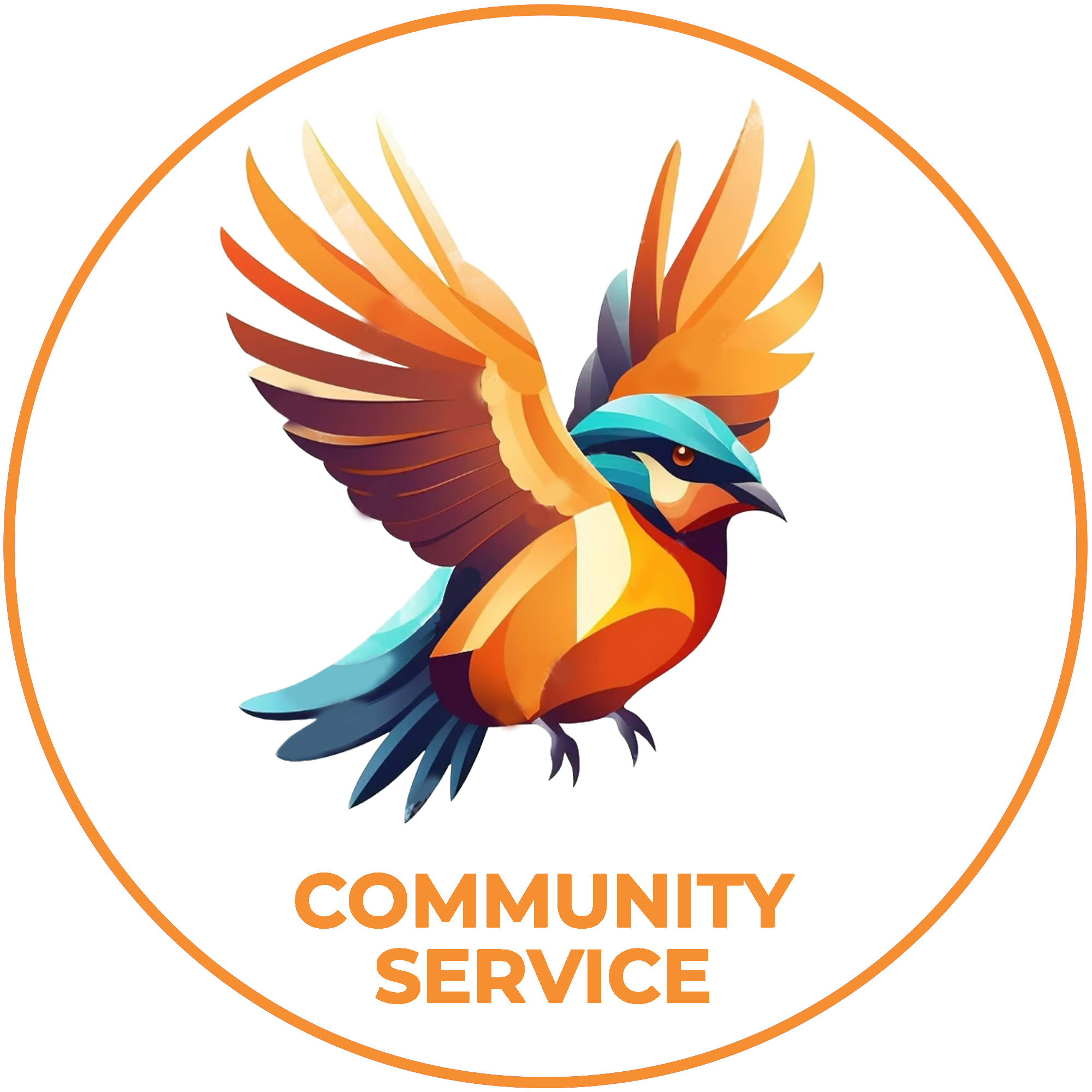
COMMUNITY SERVICE
Drops of Hope: A Journey Toward Health, Dignity & Sustainable Change
Written By: Rtr. Ashmitha Karunarathne
“Every drop of water has the power to change a life”, and thus, under the Community Service avenue, the Rotaract Club of the University of Sri Jayewardenepura recently completed “Drops of Hope,” an immense, three-phase initiative dedicated to uplifting underserved communities.
Its purpose was simple yet profound-to ensure that every child has access to safe drinking water, clean washroom facilities, and a healthier, empowered learning environment; it was rooted in the vision of supporting major UN SDGs:
- SDG 3 (Good Health and Well-being)
- SDG 6 (Clean Water and Sanitation)
- SDG 11 (Sustainable Cities and Communities)
This journey spanned from late September to early November to create a long-lasting and measurable impact on the lives of more than 350 beneficiaries.
Phase 1 – “The First Drop”
The foundation of “Drops of Hope” was built upon addressing one of the most urgent challenges faced by rural schools in Sri Lanka, unsafe and insufficient drinking water. Without safe water, students spend more time surviving than studying. To solve this, we installed a state-of-the-art Reverse Osmosis (RO) Water Refinery Filter Treatment System at Siri Dammathilaka School, Matale. Completed on November 7th with constructional support from UNA Engineering (Pvt) Ltd as the Official Construction Partner, this system now provides a reliable stream of purified water, immediately improving student health, hydration, and school attendance.
With this, the project’s first and most essential promise was fulfilled: guaranteeing clean drinking water that transforms daily life for children.
Phase 2 – “Tender Touch”
The second phase addressed another silent crisis, which was the broken, unhygienic washroom facilities in underprivileged schools. Poor sanitation not only leads to infections but also robs children of comfort and dignity. Through this phase, we renovated and restored critical washroom spaces in two schools:
- Upadyaya Vidyalaya, Panadura
- Dalthara Kanishta Vidyalaya
The effort went beyond repairing structures; it focused on making the facilities healthy and respectful learning environments for children, where they feel safe and valued. It also included awareness sessions and a donation drive so students had knowledge and facilities for proper hygiene practices.
Phase 3 – “Clean Sphere”
What makes “Drops of Hope” truly exceptional is its strong emphasis on sustainability. The final phase, “Clean Sphere,” ensured that the improvements made would not slowly disappear over time. Students from schools, Siri Dharmathilaka School, Matale, Upadyaya Vidyalaya, Panadura, and Dalthara Kanishta Vidyalaya participated in meaningful awareness sessions on hygiene, environmental care, and proper maintenance. By empowering children to take responsibility, the Rotaract Club planted the seeds of lifelong healthy habits and environmental consciousness. Additionally, donation packs containing essential cleaning and hygiene resources helped the schools implement these new practices sustainably.
This entire multi-phase initiative was made possible through strong collaboration with NOLIMIT, the Official Silver Partner, whose support reinforced the project’s reach and sustainability. Their involvement demonstrated how corporate contribution can fuel community-driven change. In addition to the sponsors, the dedicated resource persons who conducted the awareness sessions played a crucial role, offering their time and expertise to ensure the children received valuable knowledge and guidance that strengthened the long-term impact of the project.
“Drops of Hope” is not just a name; it represents a promise – a promise that every child deserves health, dignity, and the opportunity to learn in a nurturing environment. By addressing clean water, sanitation, and long-term sustainability strategically, this community service sets a very strong benchmark for impactful community service by the Rotaract Club of the University of Sri Jayewardenepura. With each drop of purified water, each renovated washroom, and each child empowered to take care of the environment, hope continues.
Graphic Design by: Rtr. Nimna Rodrigo
Monthly Gathering – July 2025
Written by: Rtr. Methsala Ariyarathna
The Rotaract Club of University of Sri Jayewardenepura (RACUSJ) kick-started the new Rotaract International year 2025–26 with its first monthly gathering for the month of July, on the 29th of July 2025, virtually via Google Meet under the vibrant and heartwarming theme of the beloved animated film “Coco”.
As the movie Coco beautifully portrays, family, memories, and staying true to who we are form the essence of every journey. Reflecting this spirit, the gathering served as a moment to celebrate life, honor our roots, and carry the warmth of togetherness into the year ahead. The session was organized by the Community Service Avenue and was gracefully moderated by Rtr. Dilini Wijewardana, who guided the evening with enthusiasm and heart.
The gathering commenced with the customary Flag Salutation, Rotaract Invocation, and Rotary Four-Way Test, symbolizing our club’s values and unity. This was followed by a heartfelt address from our Club President, Rtr. Nethmi Bandara warmly welcomed members into the new Rotaract year. She shared valuable updates on the club’s direction, including key highlights such as the upcoming Quarter One Member Intake Event – Aloha ’25, and provided insights into the member selection process that will follow the intake interviews. Additionally, she provided a brief overview of the projects lined up for August, signaling a strong, active, and purpose-driven start to the year.
One of the evening’s most anticipated moments arrived early in the gathering with the recognition of excellence within the club. Rotaractor of the Month was not awarded as July marked the beginning of the term and projects were yet to commence. Therefore, the spotlight was placed on the Director of the Month. This recognition was awarded to Rtr. Sevin Seneviratne from the Public Relations Committee, honoring his exceptional leadership and dedication during the early stages of the term.
Following the recognition, Club Secretary Rtr. Manushi Rathnayake presented the meeting minutes from the recently concluded Transition Meeting, which was held on July 26th. Her summary offered members a clear view of the structural updates and leadership handovers within the club.
The gathering then moved into avenue announcements, where each avenue provided updates on their current efforts, progress on ongoing tasks, and exciting plans for upcoming projects. This segment gave members a glimpse into the wide range of impactful initiatives being prepared and reflected the teamwork, passion, and strategic vision of the club’s leadership. Additionally, these updates reflected the dedication and drive of our directors as they prepare to make a meaningful impact in the months ahead.
As the formal proceedings concluded, the atmosphere shifted into a lighter, joyful mood with a music-themed game – “Guess the Song by Emoji.” The game turned out to be a delightful hit, as members quickly and enthusiastically guessed the songs based on emoji clues. Many participants were so quick that planned hints were hardly needed! With each correct guess, the corresponding song was played, creating an energizing environment filled with music, laughter, and genuine excitement.
To preserve the memory of this special evening, a group photo session was held. Members switched on their cameras against a specially designed virtual backdrop inspired by Coco, creating a bright and colorful moment of unity.
Before wrapping up, birthday wishes were extended to all members celebrating their birthdays in July, which was a simple yet cherished tradition that added a personal touch to the session.
With hearts full of joy and minds set on the journey ahead, the July Monthly Gathering marked a meaningful and lively start to the new Rotaract year. It reminded everyone of the power of community, the value of shared goals, and the beauty of celebrating together, just like the spirit of Coco.
As RACUSJ steps into 2025–26, this gathering stands as a promising prelude to the impactful projects and vibrant memories yet to come!
Graphic Design by: Rtr. Methsala Ariyarathna
Neth Peheli
Written by: Rtr. Manushi Rathnayake
Neth Peheli is a collaborative initiative by the Rotaract Club of the University of Sri Jayewardenepura (RACUSJ) and eight other Rotaract Clubs (Rotaract Club of Gampaha, Rotaract Club of Panadura, Rotaract Club of Rathnapura, Rotaract Club of Trincomalee, Rotaract Club of Kandy Hill Capital, Rotaract Club of Katugastota Region, Rotaract Club of Athugalpura and Rotaract Club of APIIT) to support students preparing for the G.C.E Ordinary Level (O/L) examinations.
The project aimed to provide academic guidance and essential resources to underprivileged students. The initiative was carried out in two phases: conducting an extensive seminar series on critical O/L subjects and distributing educational materials to underprivileged schools.
A total of 19 seminars were conducted in Phase 1, ensuring students from multiple schools, from underprivileged and marginalised communities, received valuable academic support. The initiative strengthened the project’s outreach, benefiting students from diverse backgrounds.
Phase 01: O/L Seminar Series
Neth Peheli conducted 19 academic seminars to prepare students for GCE O/L examinations. The seminars focused on key subjects, problem-solving techniques, and exam-oriented strategies. The sessions were held by Rotaract Clubs at various schools. The impact was significant, as students reported increased confidence in their subject knowledge and problem-solving skills. The seminars provided interactive learning opportunities and deeper understanding of key concepts. The timing of the seminars just weeks before the exams allowed students ample time to apply their learning. The initiative was successful in reaching a wide range of students and providing essential revision opportunities.
Phase 02: Donation Distribution
Neth Peheli, a project aimed at supporting underprivileged students, aimed to address their material needs by distributing essential stationery and learning materials. This initiative, which included notebooks, pens, pencils, and mathematical instruments, helped students from financially disadvantaged backgrounds continue their education without financial strain. The donation phase complemented the academic support provided in Phase 1, creating a more inclusive and supportive educational environment.
The project’s success was attributed to the collective efforts of nine Rotaract Clubs, which amplified its reach and impact. The project not only contributed to students’ academic success but also fostered a culture of learning and support.
By equipping students with knowledge, resources, and motivation, the project enhanced their educational journey and inspired them to strive for academic excellence. The project’s success serves as a testament to the impact of community-driven efforts in education and sets a strong foundation for future initiatives aimed at empowering students and bridging educational disparities.
Neth Peheli, a student from underprivileged backgrounds, initiated a program to break the cycle of poverty by providing free academic seminars and learning materials for students preparing for GCE Ordinary Level examinations. The initiative focused on Mathematics and Science, equipping students with knowledge and improving their performance. The initiative also provided essential stationery items through donation, reducing financial burdens on students and their families.
Neth Peheli also offers structured academic support to students in rural and economically challenged areas, led by Rotaract Clubs. The program offers 19 educational seminars covering critical subjects, enhancing students’ understanding of key concepts, problem-solving techniques, and exam preparation guidance. The initiative also aims to reduce educational inequality, ensuring equal access to academic guidance and resources for students from different socio-economic backgrounds.
The project also aimed to equip youth with skills for employment and entrepreneurship, breaking the poverty cycle and boosting economic growth. The project’s structure, divided into two phases, ensured a holistic approach to education. The project aligned with key Sustainable Development Goals, focusing on quality education, poverty reduction, reduced inequalities, and global partnerships. Future enhancements include expanding subject coverage, improving tutor availability, refining logistics for material distribution, and introducing follow-up programs like mentorship and performance tracking.
Graphic Design by: Rtr. Manushi Rathnayake
Transforming Lives Through Community Service
Written by: Rtr. Yasara Dewmini
Community service is a powerful force that brings about tangible change in individuals and communities. At its core, it fosters a culture of empathy, unity, and collective responsibility, inspiring people to work toward a common goal—uplifting those in need. By engaging in community service, individuals gain a deeper understanding of societal challenges, develop problem-solving skills, and nurture compassion. Volunteers often experience personal growth, learning the value of teamwork and leadership while strengthening their sense of social responsibility. Moreover, the impact of community service extends beyond those who serve; it profoundly affects recipients by improving their quality of life, providing essential resources, and offering hope for a better future. From providing education to underprivileged children to conducting mental health awareness programs, every initiative contributes to a more inclusive and equitable society. By addressing pressing issues such as poverty, healthcare access, and environmental sustainability, community service acts as a catalyst for long-term transformation. Many of these efforts align with the United Nations’ Sustainable Development Goals (SDGs), including Goal 1: No Poverty, Goal 2: Zero Hunger, Goal 3: Good Health and Well-Being, Goal 4: Quality Education, and Goal 10: Reduced Inequalities.
Beyond fulfilling immediate needs, community service fosters social cohesion and strengthens the fabric of society. When people from different backgrounds come together to serve a common purpose, they break barriers of race, religion, and economic disparity, fostering a sense of unity and mutual understanding. For instance, disaster relief efforts not only provide aid to those affected but also create strong networks of support that remain long after the crisis has passed. Similarly, mentorship programs for young students help bridge educational gaps, providing opportunities that empower the next generation. By addressing systemic issues such as gender inequality (Goal 5: Gender Equality) and economic disparity (Goal 8: Decent Work and Economic Growth), community service initiatives create an environment where progress is shared, and no one is left behind.
To ensure that community service initiatives remain effective and sustainable, organizations must prioritize long-term planning, community involvement, and capacity building. Sustainability in service projects can be achieved by focusing on empowering local communities rather than providing temporary aid. This involves creating self-sustaining programs, such as skill development workshops, microfinance opportunities, and educational initiatives, that enable individuals to become self-reliant. Collaboration with stakeholders including local governments, businesses, and NGOs can also help secure funding, resources, and expertise to sustain long-term projects. Furthermore, encouraging youth engagement through volunteer programs fosters a new generation of socially conscious leaders who will continue the cycle of giving back. Sustainable community service projects also contribute to environmental preservation (Goal 13: Climate Action), responsible consumption (Goal 12: Responsible Consumption and Production), and access to clean water and sanitation (Goal 6: Clean Water and Sanitation).
Another key aspect of sustainability is innovation. Integrating technology and modern solutions into community service projects can amplify their impact and longevity. For example, digital literacy programs equip underserved populations with essential skills for the modern job market, helping break the cycle of poverty. Similarly, sustainable farming initiatives promote food security while reducing environmental degradation. Social enterprises, which combine business strategies with community service, offer a model for financial sustainability while addressing critical issues. By leveraging technology, fostering entrepreneurship, and embracing innovative solutions, service projects can evolve to meet the changing needs of society.
Ultimately, community service is more than just an act of kindness; it is a transformative force that shapes the future of societies. When service initiatives are designed with sustainability in mind, they create lasting positive change that benefits generations to come. By aligning these efforts with global development goals and fostering partnerships, we can ensure that community service remains a driving force for social progress. In an interconnected world where challenges such as poverty, inequality, and climate change persist, the role of community service in building resilient and self-sufficient societies has never been more critical. It is through collective action, compassion, and innovation that we can make a meaningful impact and work toward a world where no one is left behind.
Youth play an instrumental role in driving community service initiatives, particularly in healthcare and social welfare projects. As the most dynamic and energetic segment of society, young individuals bring fresh perspectives, enthusiasm, and innovation to initiatives aimed at uplifting vulnerable communities. Their involvement not only amplifies the impact of such projects but also ensures their sustainability by fostering a long-term culture of service. In initiatives like Diviyata Diviyak 4.0, youth volunteers contribute by organizing health awareness programs, coordinating donation drives, and facilitating outreach efforts. By working closely with healthcare professionals, they bridge the gap between communities and essential medical services. Similarly, in mental health-focused projects like the Reachout Initiative, young volunteers take the lead in advocating for mental well-being, breaking stigmas, and providing educational resources to those in need. Engaging youth in these efforts aligns with the United Nations’ Sustainable Development Goals (SDGs), particularly Goal 3: Good Health and Well-Being, Goal 4: Quality Education, and Goal 10: Reduced Inequalities. By encouraging volunteerism and leadership development, community service projects equip young individuals with critical problem-solving skills, empathy, and a sense of responsibility toward creating a more inclusive and healthy society.
Being involved in community service initiatives has been a deeply rewarding experience for the members of our avenue, allowing us to witness firsthand the transformative power of service. Through Reachout Initiative, our team had the opportunity to lead various mental health awareness programs. Conducting mental health awareness sessions for underprivileged school students in Colombo, in collaboration with resource persons from NIMH, Angoda, was particularly impactful. These sessions provided students with crucial knowledge on mental well-being, while fostering an environment where they felt safe discussing mental health concerns. Another significant milestone was organizing the Suicide Prevention Awareness Session conducted in partnership with Sumithrayo/NIMH, which was an online webinar open to both university students and staff. This session addressed an urgent issue, helping to break the silence around mental health struggles and encouraging open conversations. Additionally, our post and video series on men’s mental health shed light on an often-overlooked aspect of mental well-being, challenging societal norms that discourage emotional openness among men.
Beyond mental health, our involvement in Diviyata Diviyak 4.0 allowed us to contribute to healthcare accessibility for vulnerable populations. One of the most heartwarming experiences was organizing a celebration for orphaned children at the Mother Theresa Orphanage in Moratuwa, where we brought joy to young children by celebrating their birthdays collectively. Through initiatives such as mobile health clinics for primary school children and maternal health awareness programs in rural communities, we have seen the power of service in action how small contributions can create lasting impacts. The experience of interacting with diverse communities, listening to their struggles, and working toward sustainable solutions has reinforced our commitment to community service. It has also taught us that true change is not achieved through one-time efforts but through consistent dedication and collaboration.
Community service is more than just an act of giving. It is a powerful force that fosters empathy, strengthens societies, and creates sustainable change. Through initiatives like Reachout Initiative and Diviyata Diviyak 4.0, we have witnessed the profound impact that dedicated efforts can have on individuals and communities. From raising awareness about mental health to improving healthcare accessibility, our journey has been one of learning, growth, and unwavering commitment to making a difference. As we continue to serve, it is essential to inspire more individuals to take part in these efforts, ensuring that our work extends beyond temporary solutions and evolves into long-term, sustainable progress. By fostering a culture of volunteerism and collaboration, we can build a future where no community is left behind and every individual has the opportunity to lead a healthier, more fulfilling life.
Diviyata Diviyak 4.0
Written by: Rtr. Sayurangi Jayasinghe
The Rotaract Club of University of Sri Jayewardenepura, through its Community Service Avenue, unveiled Diviyata Diviyak 4.0, an initiative dedicated to empowering underprivileged mothers and children all over Sri Lanka. The project focused on maternal health and well-being, with a special emphasis on underprivileged communities that often lack access to essential resources. This initiative consisted of five phases and was further expanded to support parents of children with autism and neurodevelopmental disorders.
The project began with an OC meeting, where members were briefed on their roles and responsibilities. Teams were formed, and the groundwork for the project was laid out. Volunteers collaborated effectively, ensuring a smooth execution of each phase.
Phase 01: Maternal Health Awareness Sessions
Initially, the plan was to conduct a single awareness session on maternal health. However, after identifying a significant lack of awareness in underprivileged communities, the project was expanded. Background research revealed that certain communities faced statistically high risks of child pregnancies due to cases of rape and drug abuse. As a result, we selected and reached out to the Gramasewaka officers in Singhapura, Kolonnawa, and Modara—areas known for their slum conditions and conducted our first session in collaboration with Mind Eye Counseling Services.
Another session was conducted at a prison compound, facilitated through Mrs. Elizabeth Raheem. RACUSJ became the first youth organization to conduct an early childhood development awareness session inside the prison. Since mothers incarcerated there are allowed to keep their children below the age of five with them, this session provided crucial guidance on fostering their children’s mental and physical well-being.
Through this phase, 150 mothers received awareness on maternal well-being and were also provided with essential supplies. Donations were collected from generous contributors nationwide. Posts were shared requesting monetary contributions or care packages worth Rs. 3,000, outlining the cost of each item. Some donors contributed these packages directly. Additionally, 20 stationery packs were provided for children living in the prison.
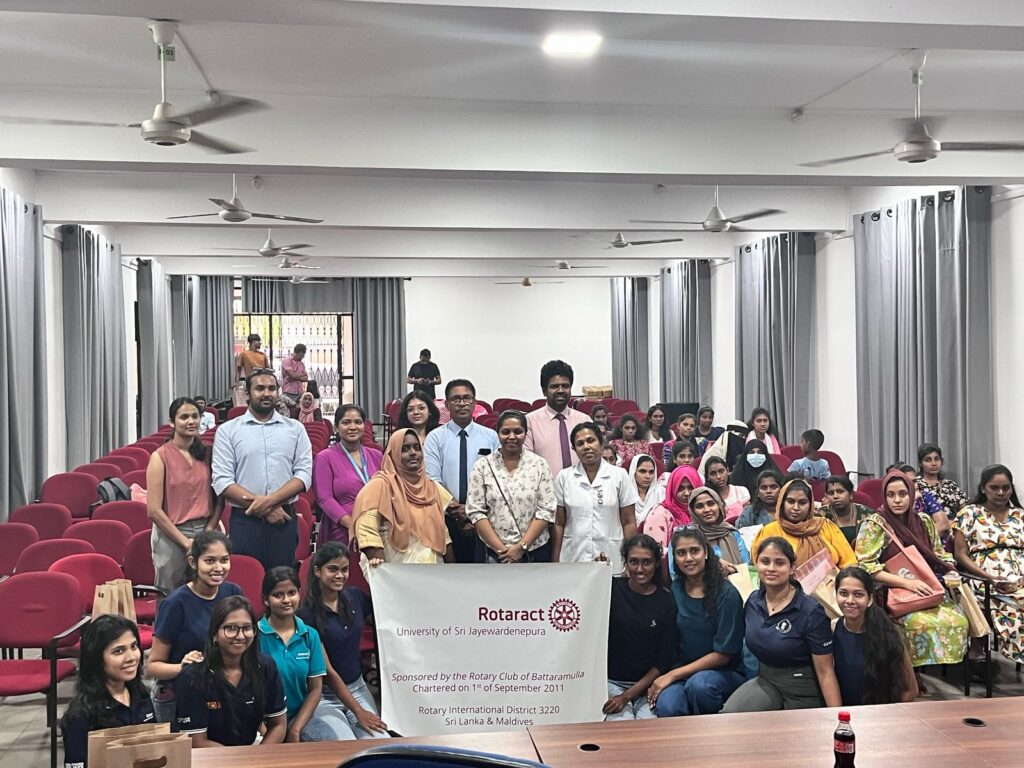
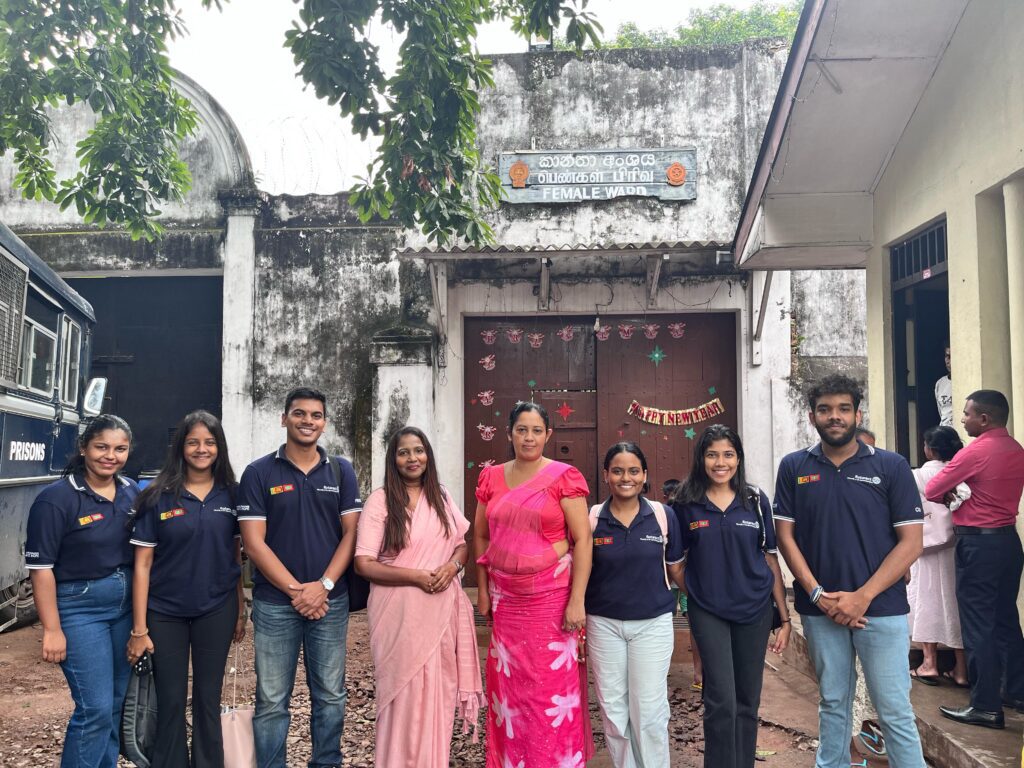
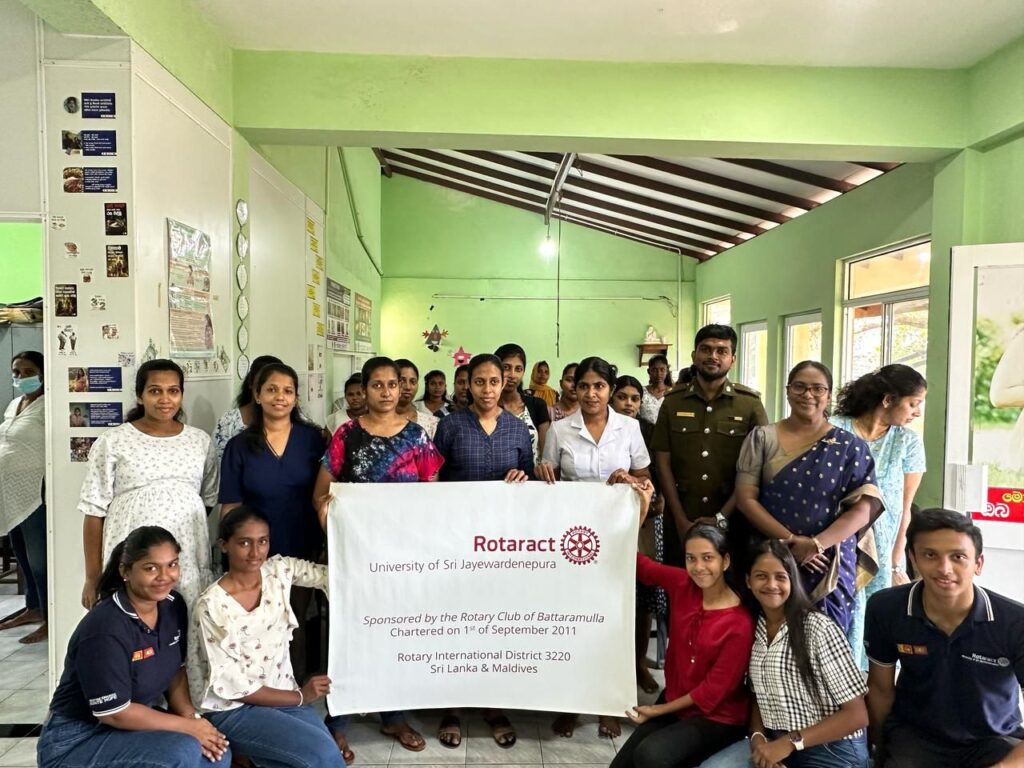
Phase 02: Donation Drive for Mothers and Children
A donation drive was conducted to collect essential supplies for mothers and children in rural communities. Public posts were sent out calling for donations, including new and second-hand items such as soap, baby clothes, and diapers. The collected donations were then distributed to poverty-stricken mothers in Kurunegala, Polonnaruwa, Panadura, and Nuwara Eliya. Some of the recipients were single mothers, while others had children with terminal illnesses.
In total, 64 clothing items and 20 pairs of footwear were collected for girls aged 1-5. Items in good condition were carefully sorted and distributed via post and courier to ensure they reached those in need.
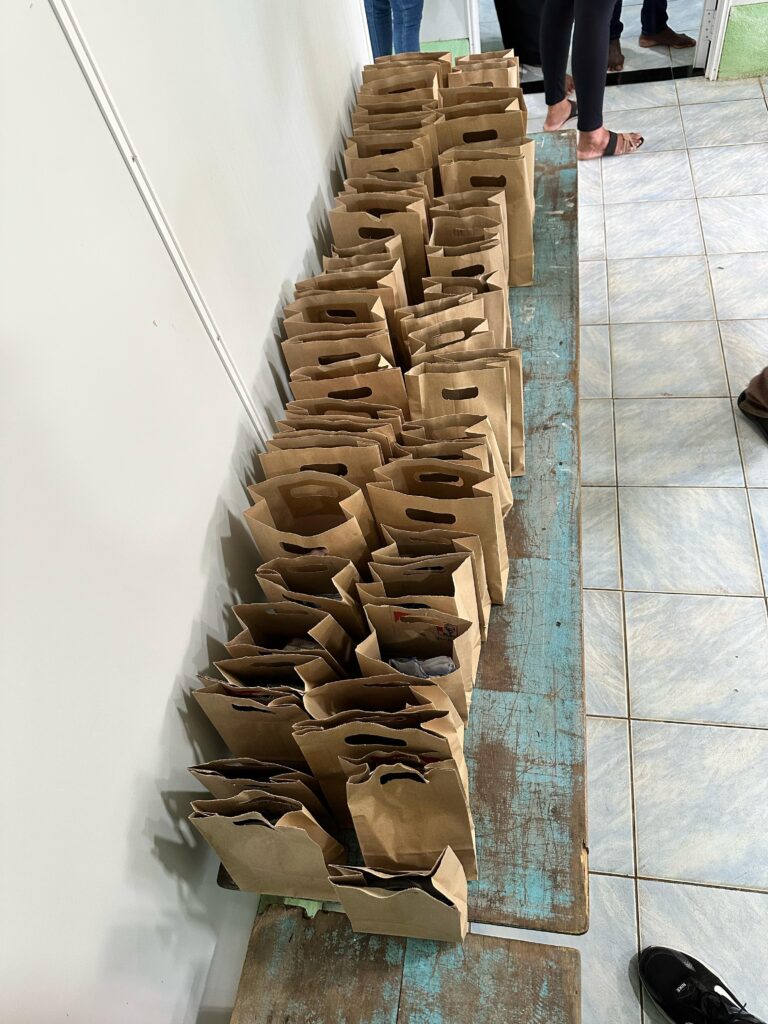
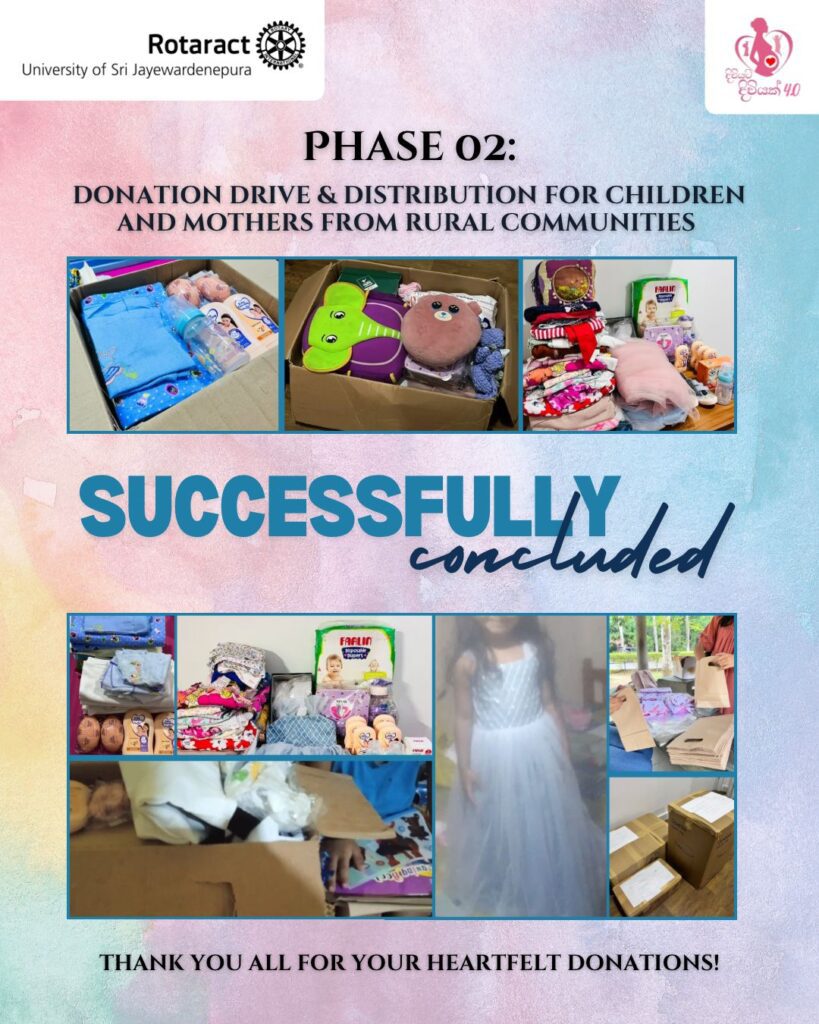
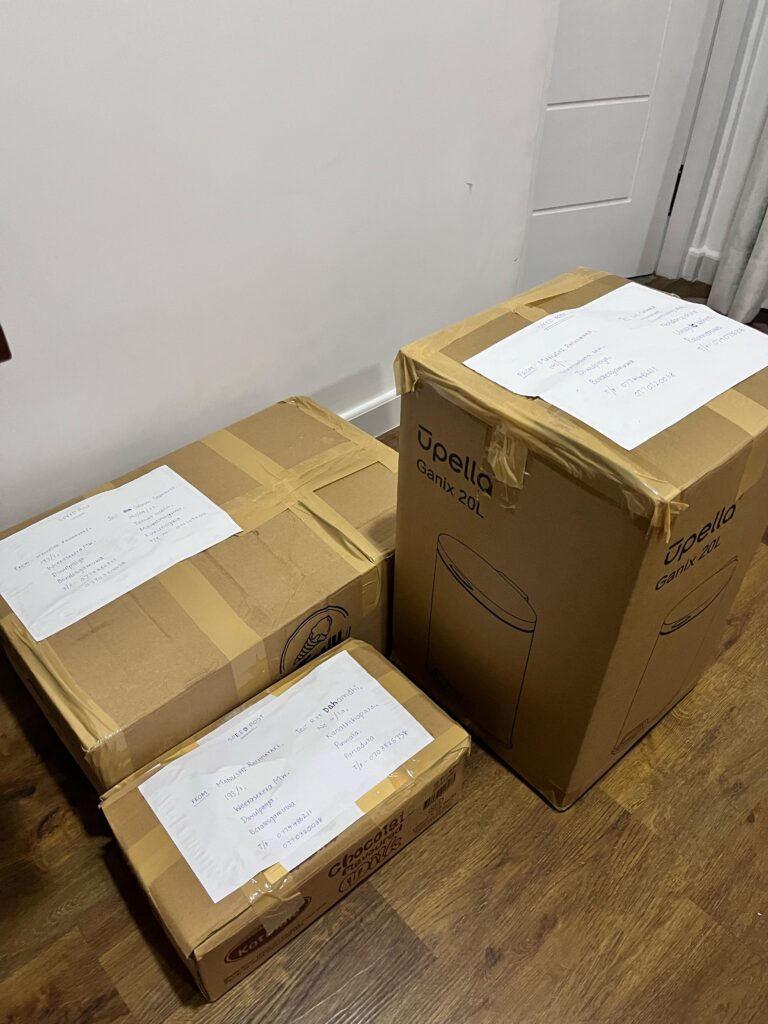
Phase 03: Celebration at Mother Theresa Orphanage
An orphanage celebration was organized for 50 children, fully sponsored by We Creations. Additionally, we provided children whose birthdays were on nearby dates with a birthday celebration, with the support of Cake Craft by U. Each child received new party attire and footwear. The event featured food, cake-cutting, and collective birthday celebrations. Volunteers engaged with the children, even dressing up as toddlers to create a more joyful and immersive experience.
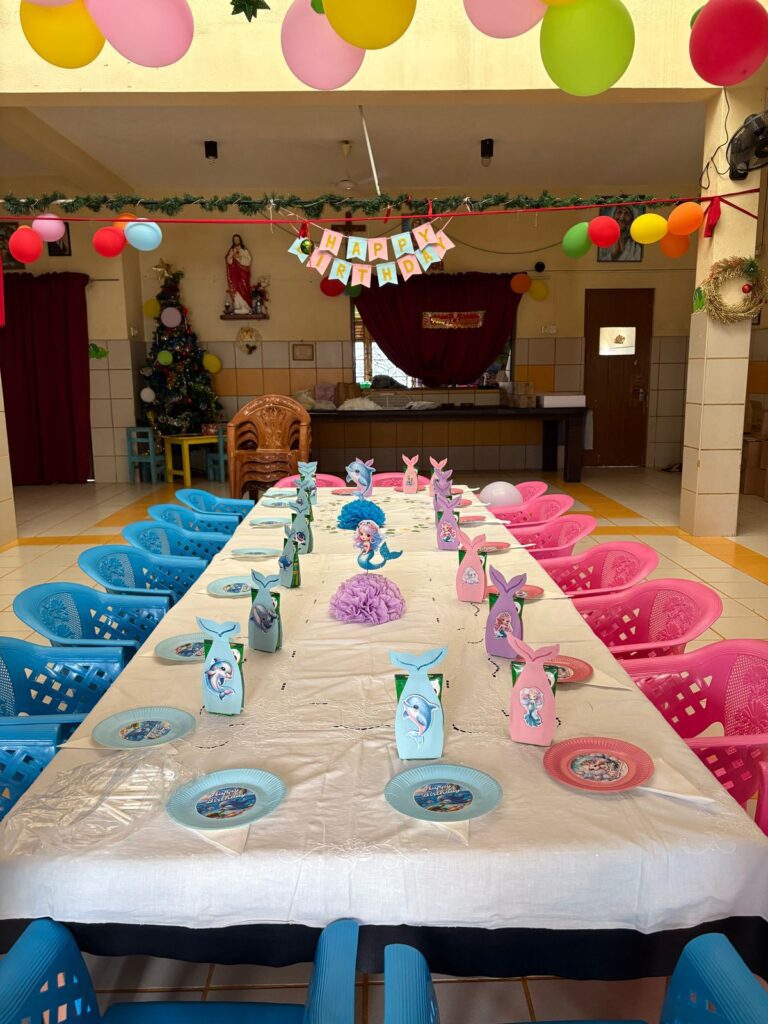
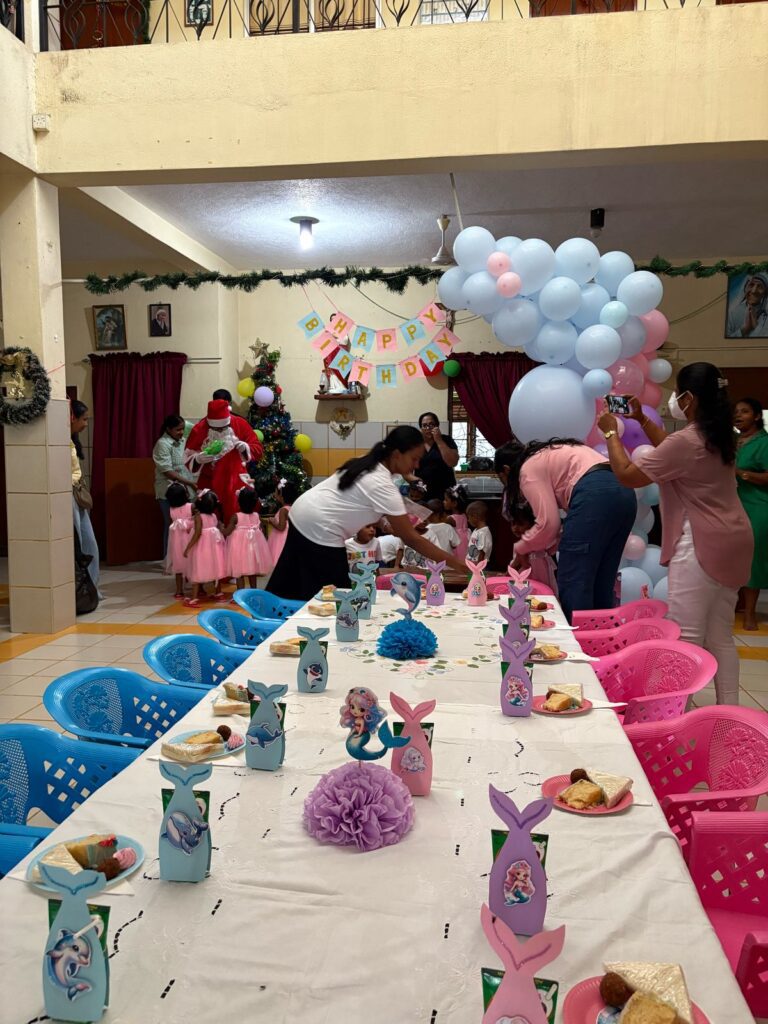
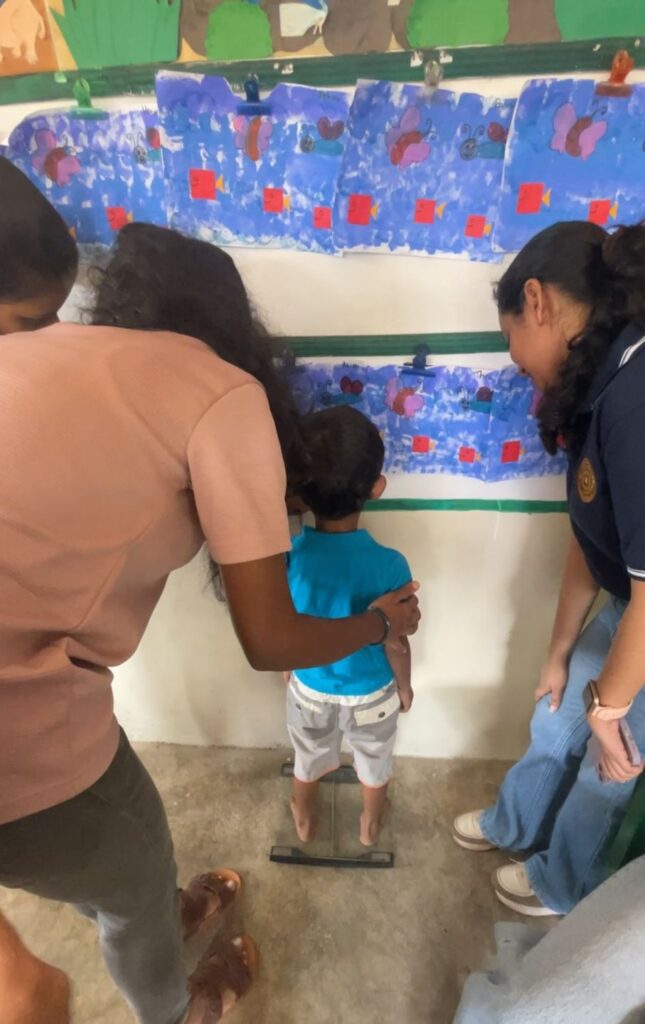
Phase 04: Mobile Health Clinic-Suwapath
A mobile health clinic was organized for underprivileged children. Necessary permissions were obtained from the Moratuwa MOH through early childhood development officers. The clinic was conducted at an underprivileged Montessori, Little Birds’ Early Childhood Development Institute, for children under five years old. Each child’s BMI was assessed, and a doctor provided health evaluations and guidance. This service was entirely free of charge, ensuring access to necessary healthcare for those in need.
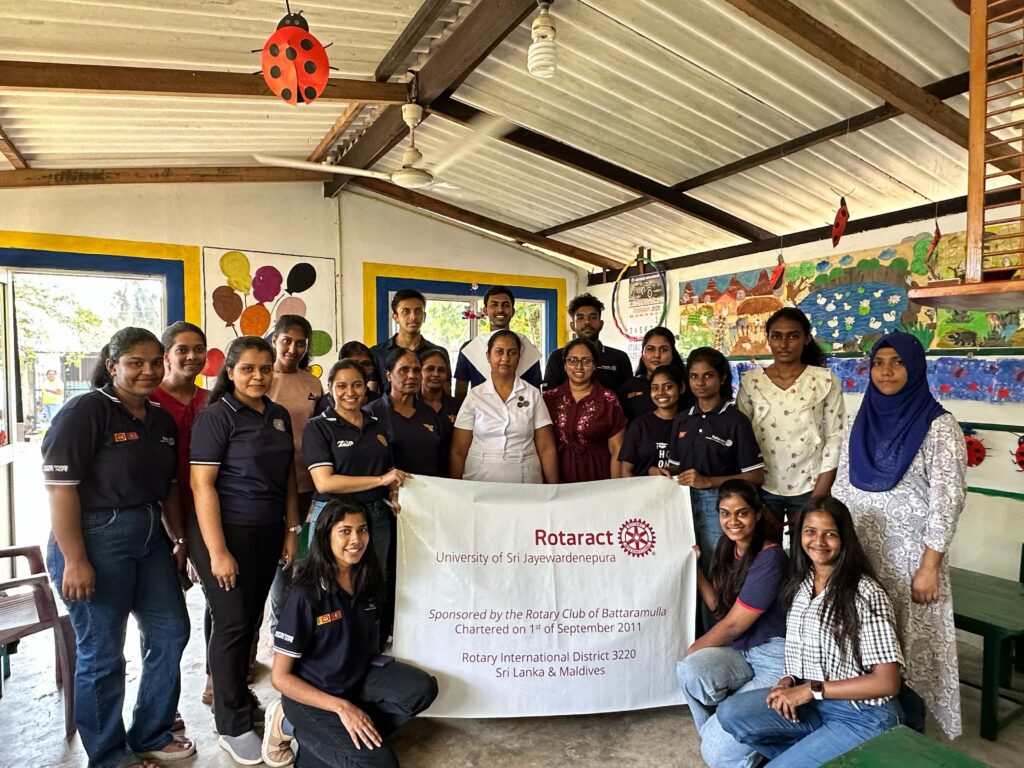
Phase 05: Autism Awareness and Resource Website
This phase focused on providing educational and self-help resources for parents of autistic and neurodivergent children. As part of this initiative, the Autism Ceylon logo was unveiled, and Sri Lanka’s first bilingual autism self-help and resource website was launched.
A highly effective PR campaign was executed, incorporating real-life stories to make the content more relatable. Emily’s story played a central role in this initiative—her mother was contacted through Facebook and was eager to collaborate, allowing us to share their family’s journey as a foundation for the website’s launch.
The campaign prioritized inclusivity, considering the sensory needs of neurodivergent individuals. To avoid overstimulation, soft colors were used instead of bright ones. The website was brought to life with the collaboration of ඔටිසම් දරුවෙකු සමග ලෝකය දකිමු, who also contributed articles. Meanwhile, our team handled the promotional efforts and drove traffic to the platform. Within just 12 hours of the website’s launch, it had already reached 770 views—an incredible milestone.
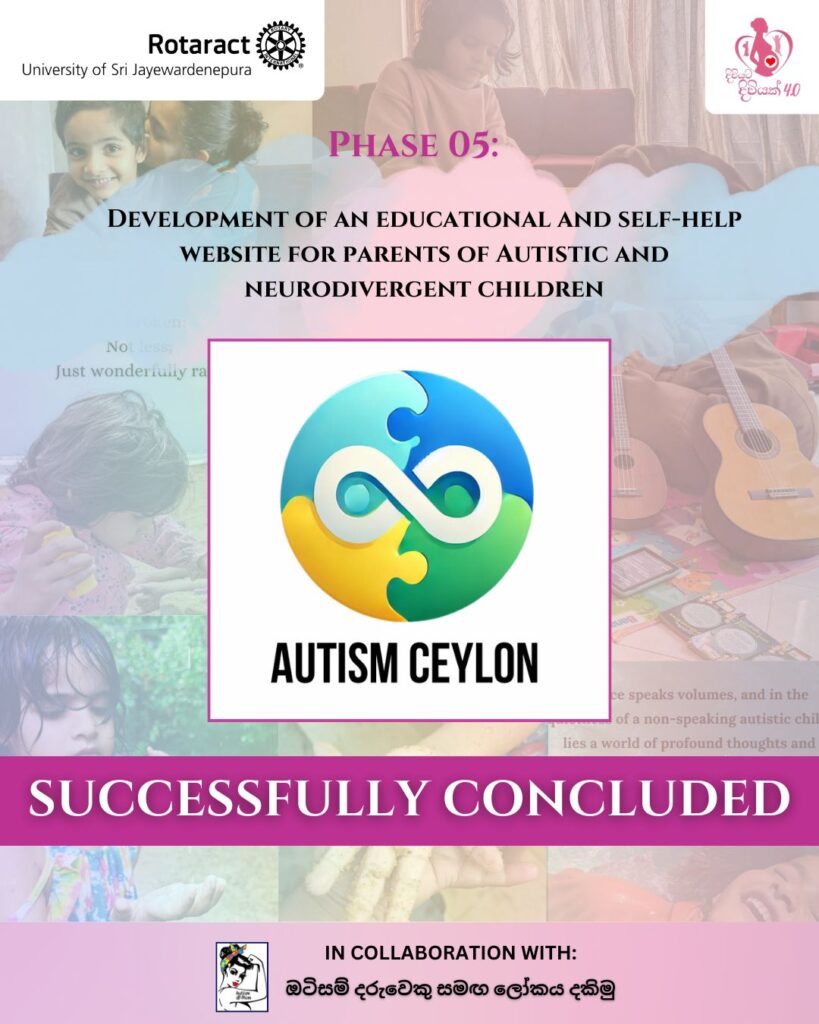
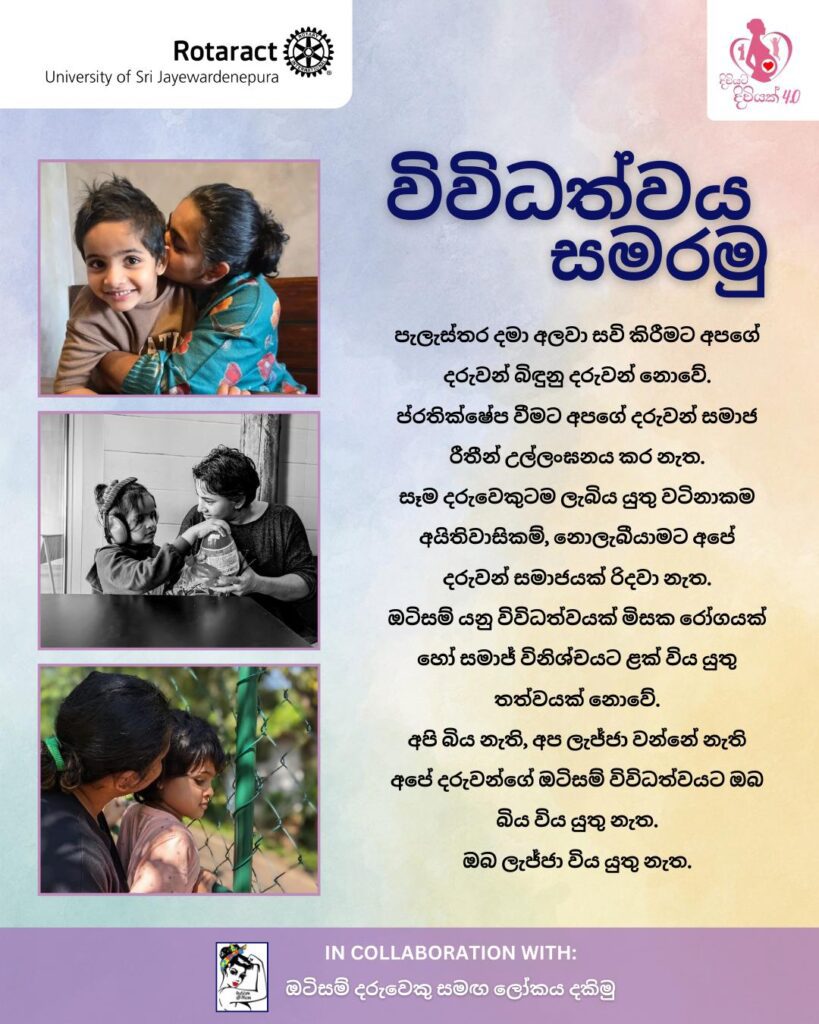
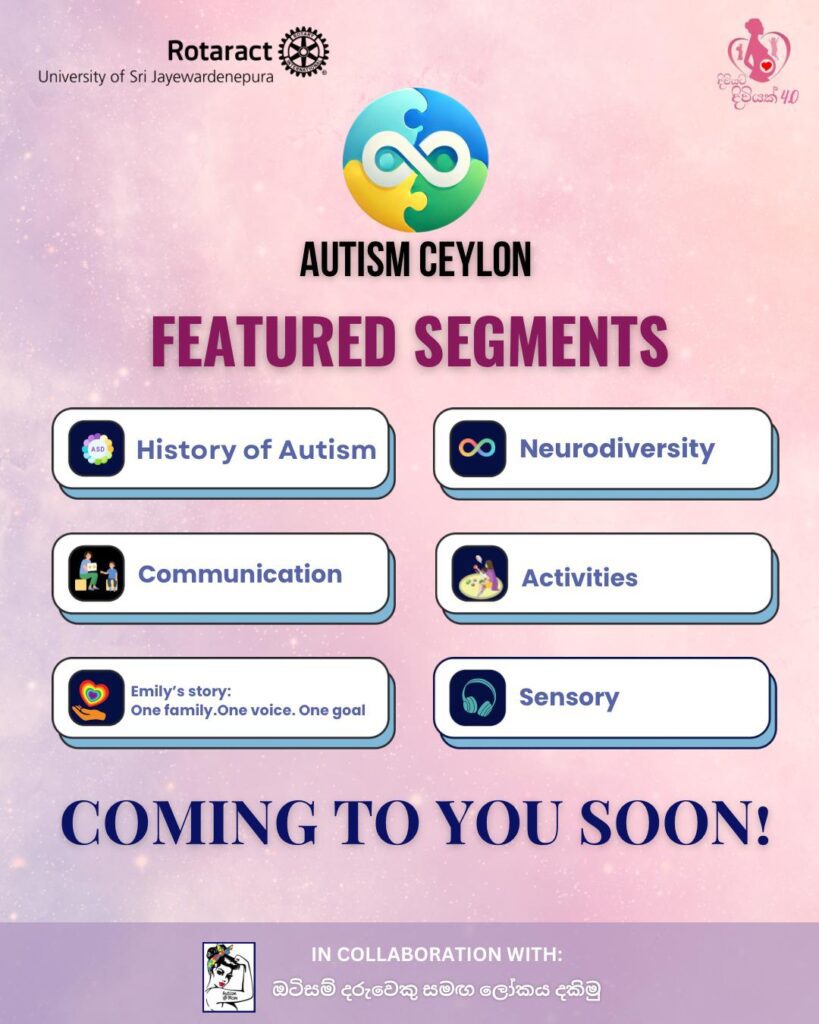
The five phases of Diviyata Diviyak 4.0 addressed various critical aspects of maternal health and well-being. Through awareness programs, donation drives, healthcare services, celebrations, and digital resources, we were able to positively impact the lives of mothers and children in underprivileged communities. Diviyata Diviyak 4.0 was more than just a community service driven project—it was an initiative that challenged boundaries and shattered doors open for disadvantaged groups. We managed to cover many Sustainable Development Goals, namely No Poverty, Industry, Innovation & Infrastructure, Good Health and Well-being, Quality Education, Reduced Inequalities, Partnerships for the Goals & Sustainable Cities and Communities. Ultimately, the project successfully achieved its goal of fostering a healthier and more informed society.
Graphic Design by: Rtr. Manushi Rathnayake
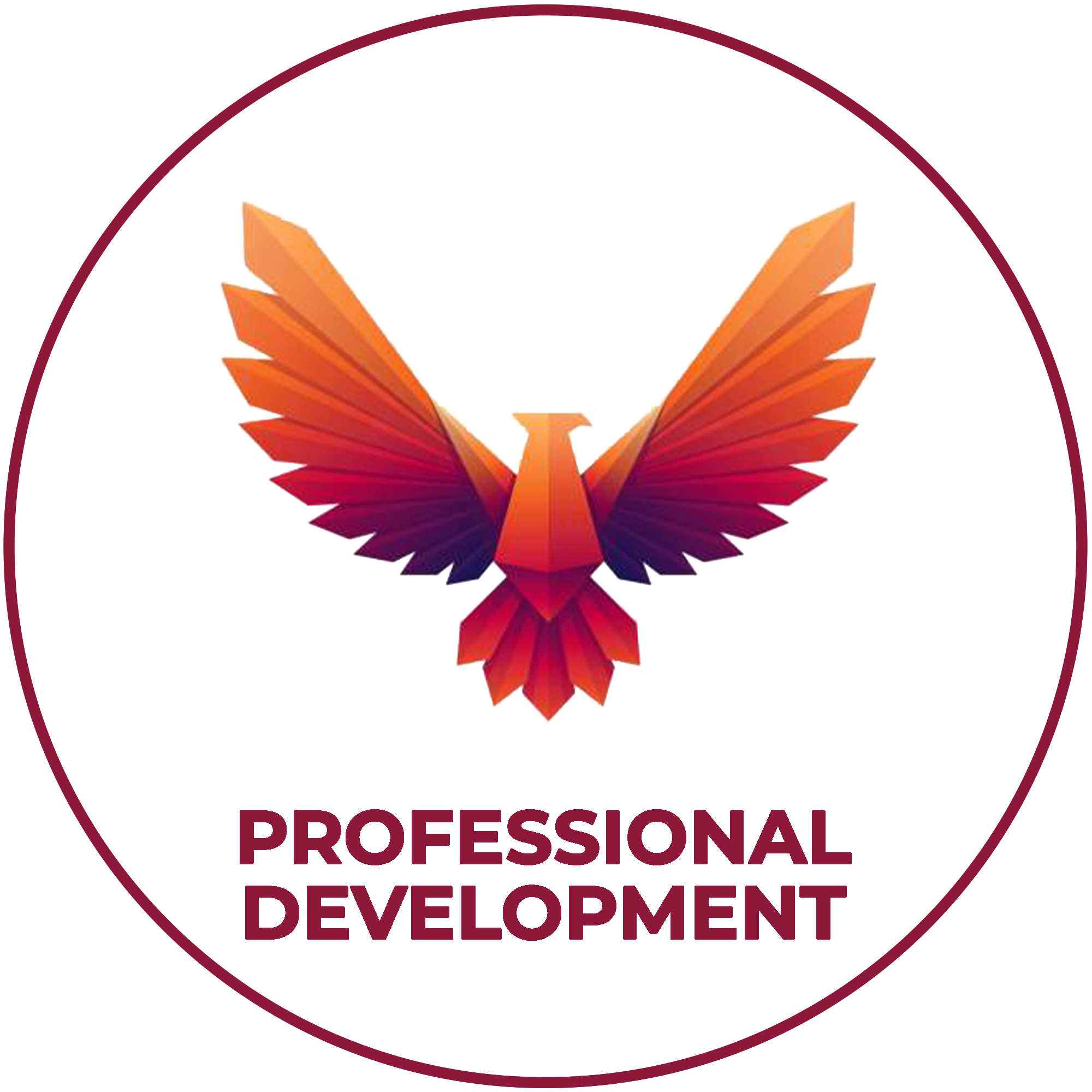
PROFESSIONAL DEVELOPMENT
Monthly Gathering – November 2025
Mind Maze ’25: Igniting Youthful Curiosity and Team Spirit
Scholastic Coach 4.0
YES ’25: Empowering the Next Generation of Entrepreneurs
Vanguard 2.0: A Journey of Leadership and Growth
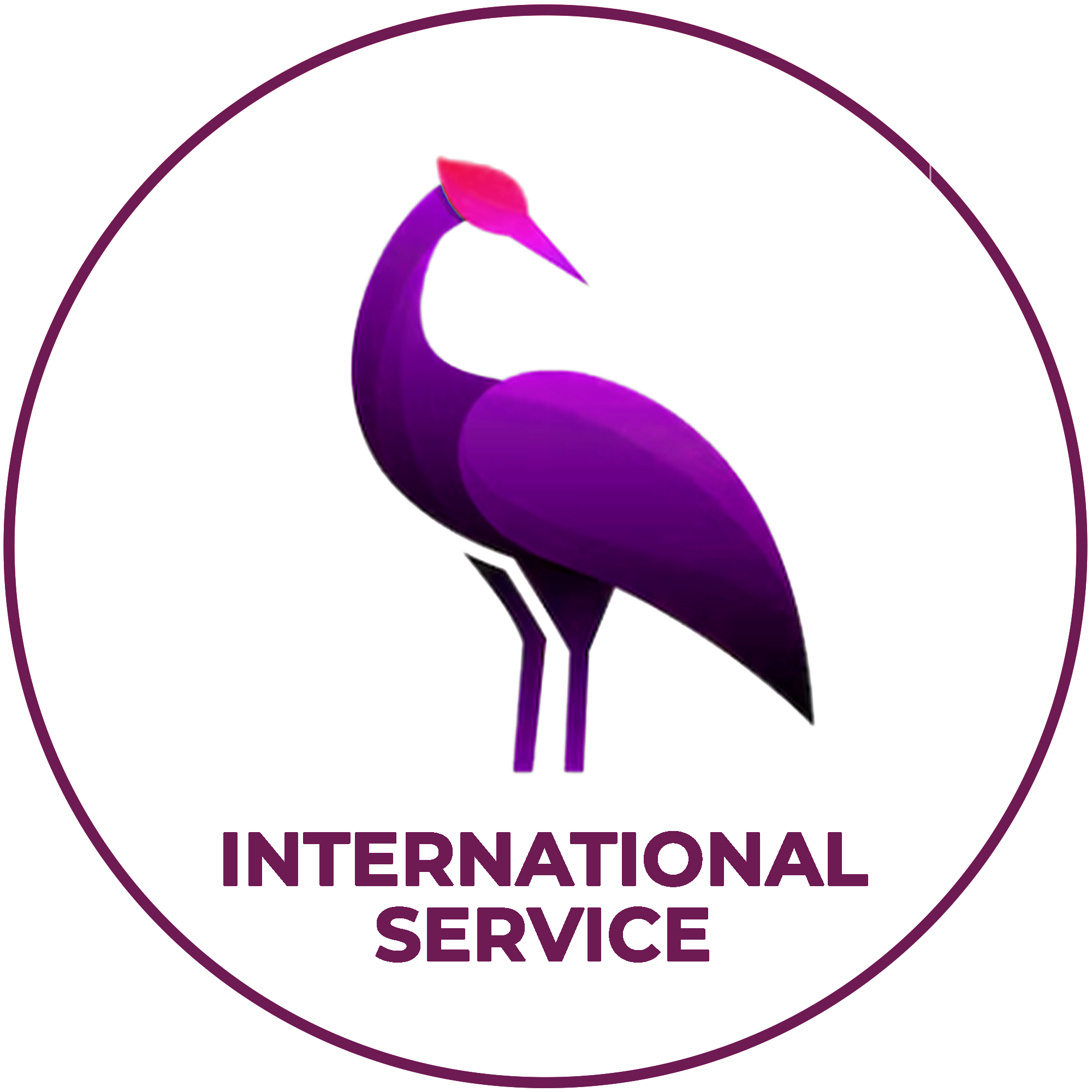
INTERNATIONAL SERVICE
Monthly Gathering – October 2025
Health A Plenty 4.0 – A Step Towards Healthier Minds and Safer Communities
Ceylon Fest 2025: A Celebration of Culture and Commerce
Heal the World 4.0: A Ripple of Kindness and Change
Global Chapters ’24
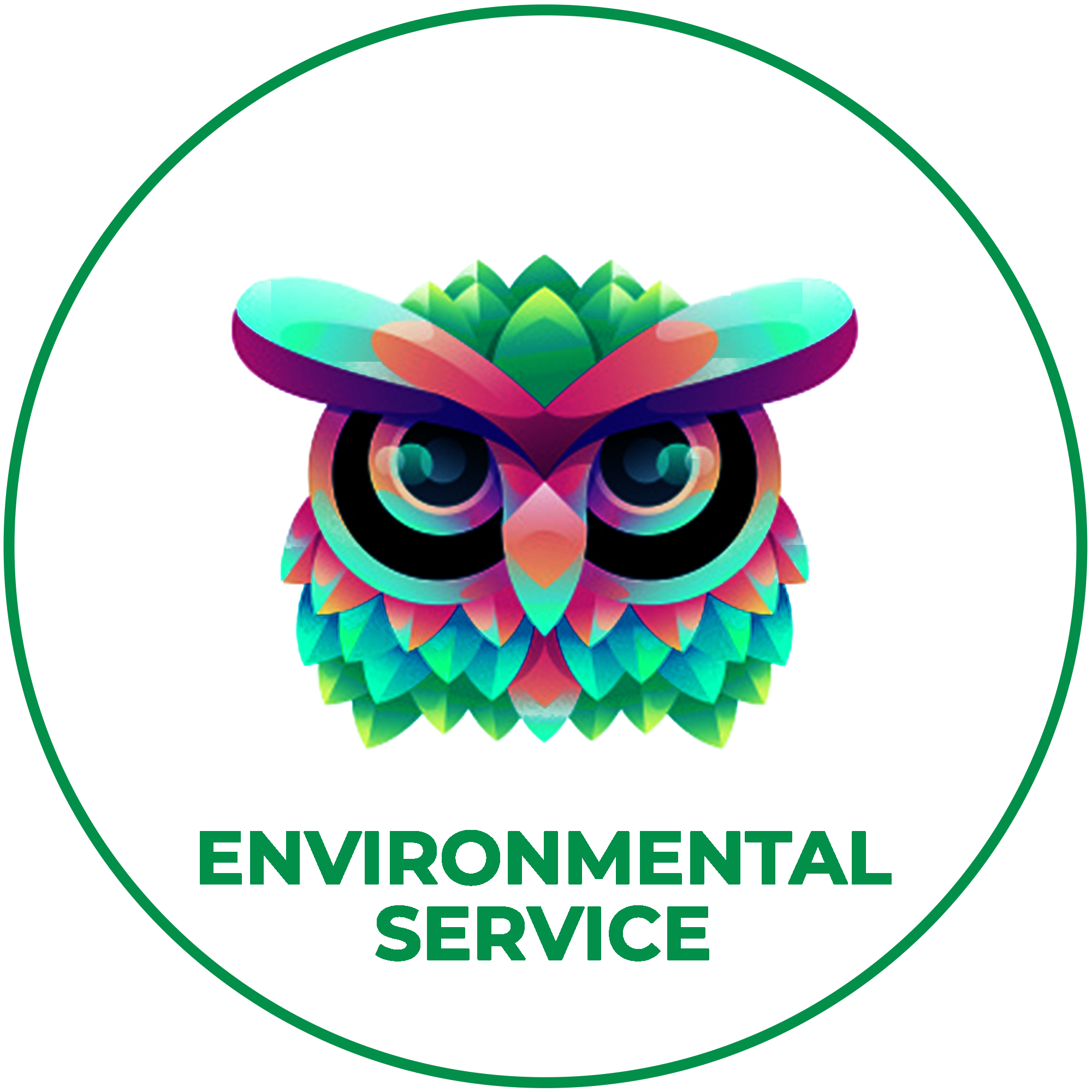
ENVIRONMENTAL SERVICE
World Elephant Day: Honouring Our Gentle Giants
World Nature Conservation Day: Conserving Nature is Conserving Life
The Water Crisis: The Global Problem. Are There Any Solutions?
Aquatica Wave 5.0
The Climate Clock is Ticking; Are We Running Out of Time?

FINANCE
Mind Maze ’25: Igniting Youthful Curiosity and Team Spirit
Monthly Gathering – September 2025
Biz Icon 2025: Inspiring the Next Generation of Business Leaders
A Memorable December 5.0
Monthly Gathering – October 2024
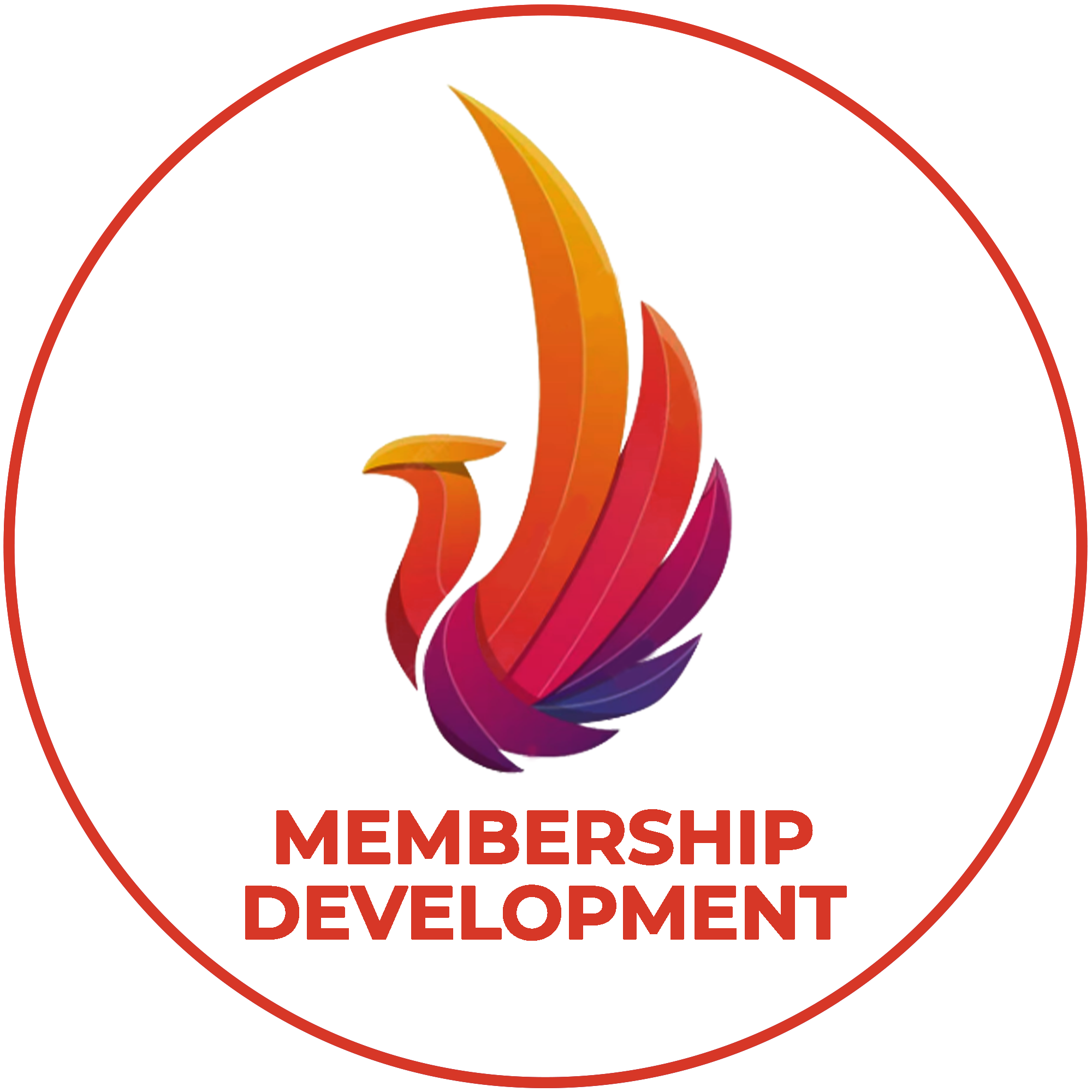
MEMBERSHIP DEVELOPMENT
The 15th Installation Ceremony of the Rotaract Club of University of Sri Jayewardenepura
Serāta ’25: Celebrating 15 Years of Rotaract Legacy
🌺Aloha to New Beginnings: Newbie Orientation of Q1
Rota Avurudu 2025: A Celebration of Tradition and Togetherness
Cinema Galore ’24: Where Entertainment meets Purpose
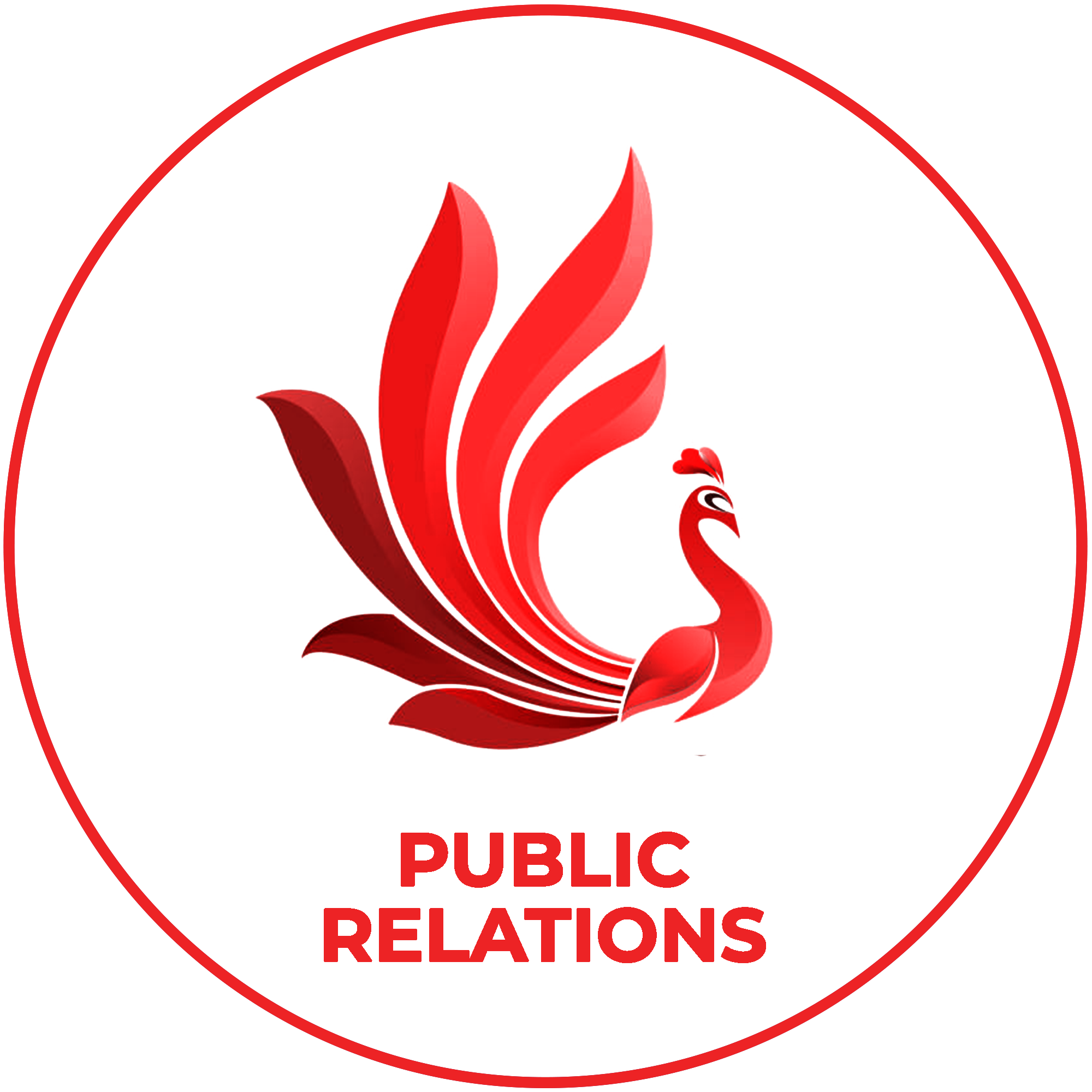
PUBLIC RELATIONS
Design Warrior 6.0
Chapter 12 – To the Next 15 Years and Beyond By Rtr. Nethmi Bandara
Chapter 11 – Letter to My Younger Rotaractors By Rtr. Tharushi Pigera
Chapter 10: How Awards Shaped RACUSJ’s Legacy
Chapter 09 – The Project That Changed Me By Rtr. Hiruni Dissanayake
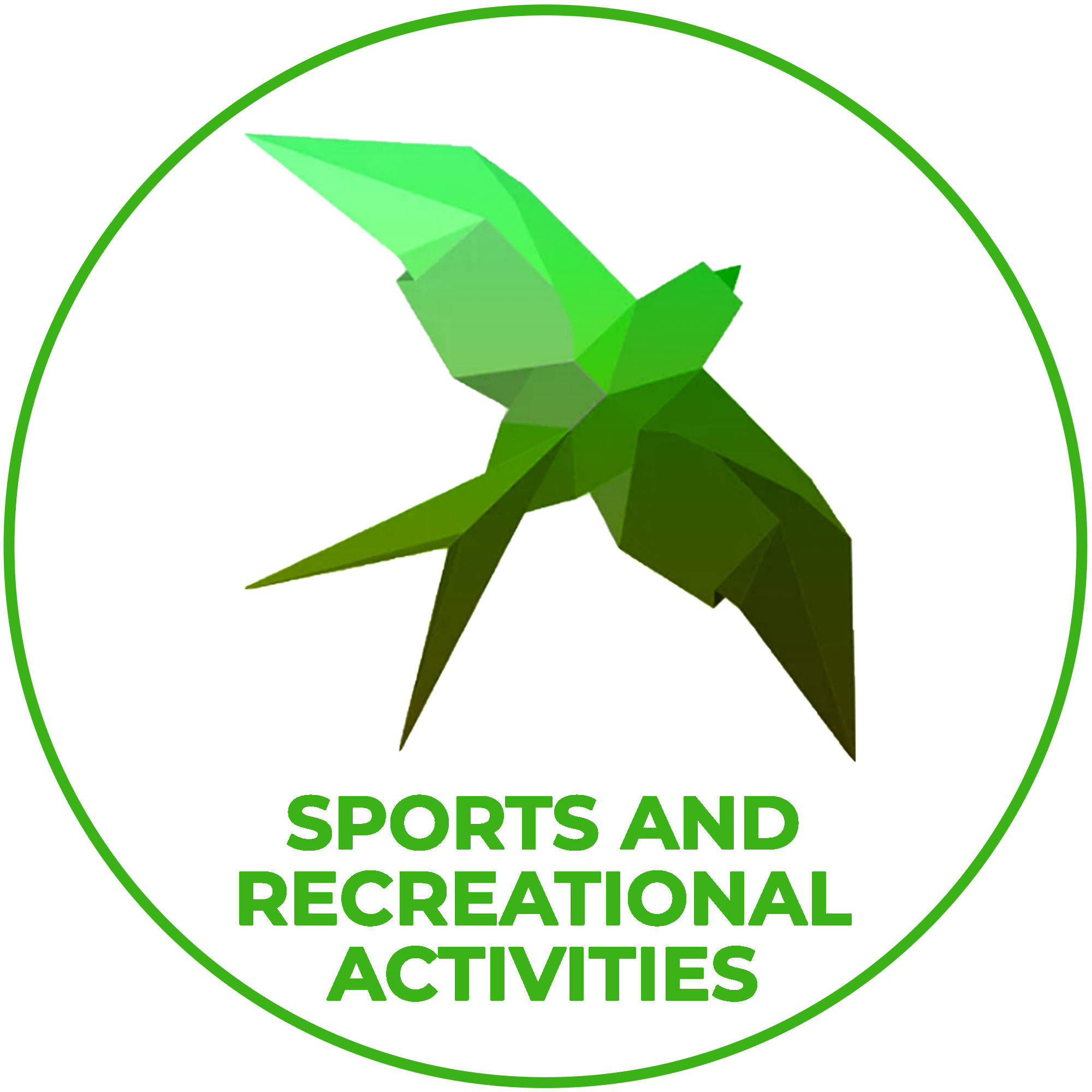
SPORTS AND RECREATIONAL
Path-Venture 2.0: A Thrilling Hike to Hawagala
Sports as a Language of Health, Friendship and Unity
Amigo 3.0 – A Fun-Filled Adventure of Games and Friendship!
Monthly Gathering & Iftar Celebration – March
Path-Venture: A Thrilling Hike to Bathalegala
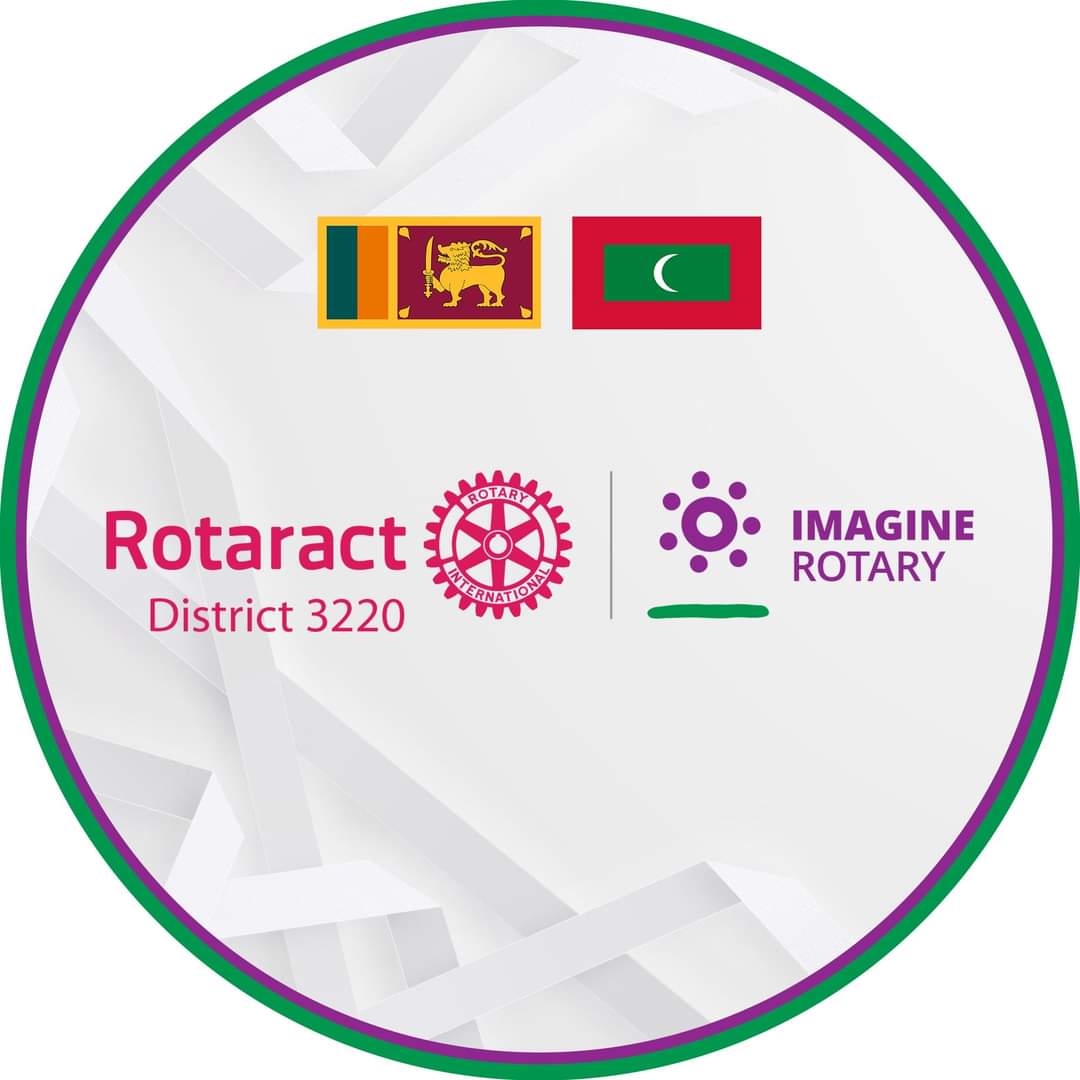
DISTRICT & OTHER CLUB INITIATIVES
35th Rotaract District Assembly – RACUSJ stood steady with pride again!
More Than a Leadership Camp – My RYLA Story
The 34th Rotaract District Assembly – RACUSJ marvels us yet again!
RYLA 2023-24
Igniting Hope and Empowering Youth: The 33rd Rotaract District Assembly
Are we ready for the next pandemic?
Dec 26, 2025 | 0 Comments
The Spirit of Christmas: A Celebration of Faith, Family, and Goodwill
Dec 24, 2025 | 0 Comments
Rising Above the Waves: Understanding Tsunami Awareness and Preparedness
Nov 5, 2025 | 0 Comments
World United Nations Day
Oct 24, 2025 | 0 Comments
Light over Darkness – Good over Evil: The Vibrant Story of Deepavali
Oct 19, 2025 | 0 Comments
The Invisible Ingredient: How Your Kitchen Habits are Shaping the Future of Food
Oct 16, 2025 | 1 Comment
World Mental Health Day 2025 – A Call To Action
Oct 10, 2025 | 0 Comments
Celebrating the Hands That Built Generations: World Teachers’ Day
Oct 6, 2025 | 0 Comments
The Shoes of Injustice : International Day of Peace
Sep 21, 2025 | 0 Comments
World Ozone Day 2025
Sep 15, 2025 | 0 Comments
Amidst Cyclone Ditwah: The Silent Struggle and Rescue of Sri Lanka’s Animals
Dec 23, 2025 | 0 Comments
Monthly Gathering – November 2025
Dec 21, 2025 | 0 Comments
Building a Healthier Future Through Awareness and Action – Raising awareness about Diabetes
Dec 7, 2025 | 0 Comments
Monthly Gathering – October 2025
Nov 12, 2025 | 0 Comments
Monthly Gathering – September 2025
Oct 28, 2025 | 0 Comments
Loving the Unlovable – The True Essence of Teaching
Oct 12, 2025 | 0 Comments
𝐓𝐨 𝐁𝐞 𝐚 𝐑𝐚𝐜𝐨𝐧𝐭𝐞𝐮𝐫
Sep 29, 2025 | 0 Comments
Chapter 12 – To the Next 15 Years and Beyond By Rtr. Nethmi Bandara
Sep 18, 2025 | 0 Comments
Chapter 11 – Letter to My Younger Rotaractors By Rtr. Tharushi Pigera
Sep 13, 2025 | 0 Comments
Chapter 10: How Awards Shaped RACUSJ’s Legacy
Sep 12, 2025 | 0 Comments
